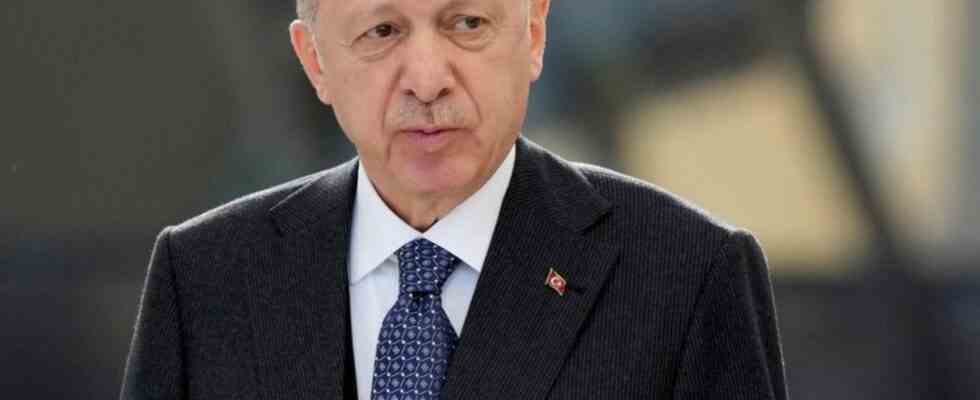Diplomatic relations
Erdogan visits Saudi Arabia after Khashoggi assassination
Turkish President Recep Tayyip Erdogan wants to meet the Crown Prince and King Salman in Jeddah. Photo: Ebrahim Noroozi/AP/dpa
© dpa-infocom GmbH
The murder of Saudi journalist Khashoggi has strained their relations with the royal family. Now Turkish President Erdogan is traveling to Saudi Arabia. It shows how much pressure he is under.
With a grim expression, Turkish President Recep Tayyip Erdogan walked past the Saudi crown prince and didn’t look at him. That was three years ago at the G20 summit in Buenos Aires. Not only Erdogan, numerous world politicians cut the de facto ruler of Saudi Arabia, Mohammed bin Salman.
Nobody wanted to be photographed with someone suspected of being involved in one of the most gruesome political killings in recent years: the killing of journalist Jamal Khashoggi.
sign of approach
But some time has passed since then, and the signs point to a convergence. Erdogan is scheduled to meet the crown prince and King Salman in Jeddah today – his first visit to Saudi Arabia since the Khashoggi assassination. The journalist and government critic was killed in his country’s consulate in Istanbul in October 2018. His body was dismembered and has not been found to this day.
The US secret services see Crown Prince Mohammed as the mastermind. The royal family rejects this. Erdogan also indirectly linked the crown prince to the crime. He spoke of a “barbaric murder” and said he would not allow a cover-up. 26 defendants, including an ex-adviser to the crown prince and the former deputy chief of intelligence, were charged in absentia in Turkey. But in April, Turkey surprisingly dropped the case – a court handed over the murder trial to Saudi Arabia.
The Turkey representative of Reporters Without Borders, Erol Önderoglu, described the decision as a “political strategy”. Nothing stands in the way of reconciliation with Saudi Arabia. Erdogan, who has long been isolated in the region, no longer seems to want to cross paths with the crown prince.
Background for Erdogan’s visit
The unfortunate situation in which Erdogan is currently located should also be the background. The Turkish national currency, the lira, is losing value, inflation is rising and with it the dissatisfaction of the population – Erdogan’s poll numbers are falling. Relations with Europe and the USA improved again in the course of the Ukraine war, but are still tense. Erdogan is looking for new partners and is not only turning to Saudi Arabia. Recently there has also been a rapprochement with Armenia, the Emirates and Israel.
In the rich oil state, Erdogan can now hope for commitments for fresh investments. He will also be keen to end an unofficial boycott of Turkish goods that Saudi entrepreneurs and traders called for in 2020. The result was a slump in the export of Turkish goods.
Erdogan has shown pragmatism in the past. It’s no different this time, believes Turkey and the Middle East expert at the Center for Turkish Studies (CATS) in Berlin, Hürcan Asli Aksoy. “Ankara is clearly acting in an interest-based manner.” Differences such as the Khashoggi case or ideology are of secondary importance.
Impact on Saudi Arabia
Saudi Arabia, on the other hand, hopes to shelve the case entirely. The murder has brought much criticism to the country and severely damaged the crown prince’s image. Turkish media close to the government discredited “MBS” and even gave him the nickname “Abu Minshar” because of the murder – roughly translated as “master of the saw”. Saudi Arabia survived the affair without major damage – also thanks to former US President Donald Trump, who refrained from sanctions for economic and political reasons.
Turkey has also come closer again with the Emirates – Abu Dhabi now wants to invest up to ten billion US dollars in Turkey. Old ideological conflicts in the region seem to be losing their meaning more and more. Turkey’s relations with parts of the Arab world had progressively deteriorated following the 2011 uprisings that toppled several long-term rulers in the region. Turkey supported Islamist groups such as the Muslim Brotherhood in an attempt to assume a leading role.
For Egypt, Saudi Arabia and the Emirates, on the other hand, the Muslim Brotherhood is a red rag. There, as well as in Syria, Bahrain and Russia, the “MB”, founded in 1928, is classified as a terrorist organization. A front emerged with Turkey and its ally Qatar on one side and Saudi Arabia, the Emirates and Egypt on the other. In the conflict in Libya, the blocs also supported different sides.
US withdrawal
In the meantime, however, the Islamists have suffered setbacks in Morocco and Tunisia, for example, and have been weakened. Under President Joe Biden, the US is increasingly withdrawing from the region, similar to what it was under Barack Obama, and turning its gaze to Southeast Asia. Large players such as Riyadh, Abu Dhabi and Cairo are therefore also looking for new alliances. They don’t want to be alone in the conflict with arch-enemy Iran, while Iran’s nuclear program is being renegotiated with Washington, among others.
Turkey, on the other hand, which has comparatively good relations with Iran, has increasingly isolated itself in the region due to its aggressive foreign policy, such as in the eastern Mediterranean. “The tensions cannot be continued, neither economically nor geopolitically,” says expert Aksoy. This applies not only to Turkey, but to all actors in the region.
Is the investigation of the Khashoggi case falling by the wayside? After Erdogan’s visit, it could become less likely. The Wall Street Journal, citing government officials, reported that the crown prince wanted a promise from Erdogan that he would no longer mention the Khashoggi case at all.

